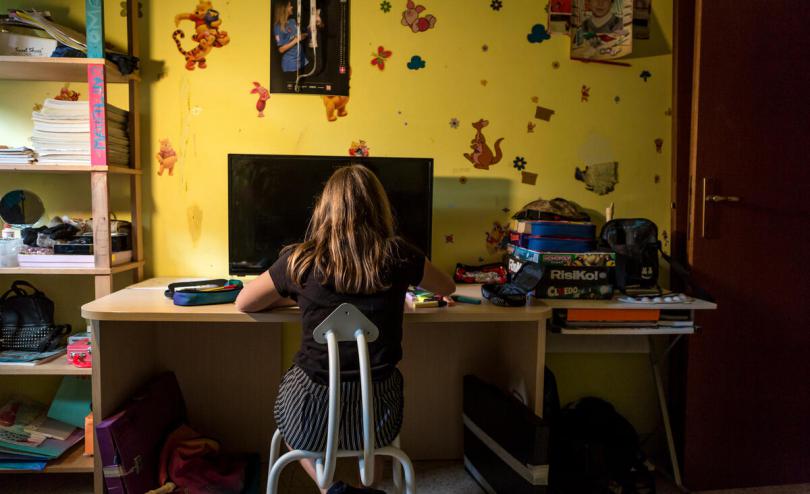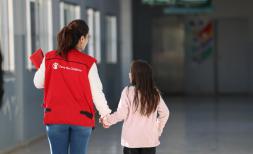‘Children at risk of lasting psychological distress from coronavirus lockdown’: Save the Children

Almost one in four children living under COVID-19 lockdowns, social restrictions and school closures are dealing with feelings of anxiety, with many at risk of lasting psychological distress, including depression. In recent surveys by Save the Children of over 6000 children and parents in the US, Germany, Finland, Spain and the UK, up to 65 per cent of the children struggled with boredom and feelings of isolation.
Even as several countries gradually begin lifting their lockdowns, many schools remain closed—affecting almost 1.3 billion children and students worldwide —and strict social restrictions are likely to remain in place across the globe.
This leaves children and youth who are already at risk—such as those living in challenging home environments or children who are lacking social support or whose families are already facing poverty —especially vulnerable.
Research shows that feelings of helplessness, loneliness and fear of being socially excluded, stigmatised or separated from loved ones are common in any epidemic, while prolonged stress, boredom and social isolation, as well as a lack of outdoor play, can lead to a higher number of mental health conditions in children, such as anxiety and even depression.
Anne-Sophie Dybdal, Senior Child Protection Advisor at the Mental Health and Psychosocial Support Unit of Save the Children, said: “People who are outside regularly have a lower activity in the part of the brain that focuses on repetitive negative emotions. This is one of the reasons children can slide into negative feelings or even depression during the circumstances they are living in now.”
In the surveys recently conducted by Save the Children in the US and several European countries children reported feeling anxious, bored and fearful. Being unable to play outside with friends or fears of falling behind in their education, added to their feelings of deprivation and anxiety.
Among other things, the surveys also revealed that:
- Nearly half (49 per cent) of interviewed children in the United States said they were worried, while just over one third (34 per cent) reported feeling scared, and one quarter (27 per cent) felt anxious.
- 70 percent of participating children in Finland reported experiencing feelings of anxiety, over 55 per cent said they were fatigued.
- In the UK, 20 per cent of the interviewed children worried about the future due to school closures, and almost 60 per cent worried that a relative might fall sick.
- In Germany, one third (33 per cent) of children said they were worried they would not be able to finish their school year.
In Spain, where Save the Children interviewed nearly 2,000 lower-income families, over a quarter of them reported higher levels of distress than normal, and many households reported their children were struggling with fear, anguish and concern about their family’s situation.
Save the Children also spoke with an additional 60 children in Nicaragua and 68 children in Indonesia, where findings were similar. In Nicaragua children said that they were afraid and frustrated about not being able to go to school, and the possibility of family members falling ill. In Indonesia, 66% of the children reported they were worried about the current pandemic, especially of falling ill with the virus.
"[I feel] afraid. It is a pandemic and things are infected... and my mother goes out to work and it scares me", said Karla, 11, from Nicaragua.
Marie Dahl, Head of Save the Children’s Mental Health & Psychosocial Support Unit, said: “While children are resilient, we cannot underestimate the impact the pandemic is having on their mental wellbeing and overall health. Children in a stable environment are likely to fare better, but many children are not so fortunate. Those who are living in poverty, who are experiencing violence at home, or are otherwise vulnerable can really be pushed over the edge by long lasting lockdowns—in the worst cases if left unaddressed this could escalate to depression and other mental health concerns. The mental health impacts of COVID-19 could be seen far beyond the life of the pandemic.”
Save the Children is calling on all governments to prioritise and invest in children’s mental health, wellbeing and learning as part of their response to the outbreak. This includes support for children living in the world’s poorest and most fragile countries or conflict affected communities, that may be less equipped to respond to the needs of children who could be separated from parents due to illness, isolation measures or bereavement.
In addition, Save the Children is calling for:
- All children to have access to support services during and after lockdown, and prioritising the work of social care providers, including by classifying them as essential services, so they have the resources and capacity to do their work.
- Schools, social services and authorities to monitor children during lockdowns and continue case management through remote approaches until society and schools reopen and further support can be provided. This includes ensuring distance learning accessible for all children, which should contain messages on health, hygiene and keeping safe.
- Parents and teachers must receive support to maintain structure and routine for the children, and to keep children engaged in play and learning activities in school and at home.
- Mechanisms to be in place for early detection of signs, such as sudden changes in behaviour, unusual persistent sadness, excessive worry, a lack of concentration, trouble sleeping, or exhaustion, which could point towards looming mental health issues such as a depression.
Ms. Dahl continued: “Children are suffering enormous upheaval on a scale that we have not seen in this lifetime. There have been many sudden changes to their lives and so much is yet unknown about the long-term impacts of this crisis, which requires us to be vigilant and do everything possible to limit the impact on young minds”
“While some countries are starting to re-open schools, many children are still missing out on an education. It’s important that all countries are able to detect and respond to signs of distress and depression among children during lockdown and once these children return to public life.”
To support Save the Children’s global COVID-19 emergency appeal, click here.
NOTES TO EDITORS
- Save the Children Child Protection staff conducted phone-based and online surveys to determine the effects of the social restrictions on children in the United States (1,500 parents and children), Spain (2,000 households), UK (1,002 parents), Finland (1,121 children and youth), Germany (1,002 parents and children), Nicaragua (60 children) and Indonesia (68 children), in March and April 2020.
- Save the Children works in schools, health facilities, refugee camps and child friendly spaces, with national staff and partners trained to pick up on warning signs of distress among children and provide them with age appropriate support as needed. Where lock down and physical distancing measures are imposed, Save the Children has adapted its programmes to support children and families from a distance by developing child and caregiver friendly messaging disseminated through sms, radio, television and home learning and wellbeing kits with information about COVID-19 and how to support mental wellbeing for children and their caregivers. Parenting tips during school closures have been disseminated, case management and alternative care protocols adapted and support to continued education provided through remote learning approaches.
- Save the Children is ensuring the meaningful engagement of children and youth by enabling them to play an effective role in awareness raising, community engagement and donors engagement to support their own initiatives and personal plans to stay connected, continue developing key life skills and look after their mental health.
- Save the Children is also training thousands of community members and community workers all over the world, to raise awareness of COVID-19 and how to ensure the safety of children in vulnerable communities.
We have spokespeople available, so feel free to reach out:
Rik Goverde, rik.goverde@savethechildren.org / +44 (0) 7732 602 301
During out of office hours: Media@savethechildren.org.uk +44 7831 650 409




